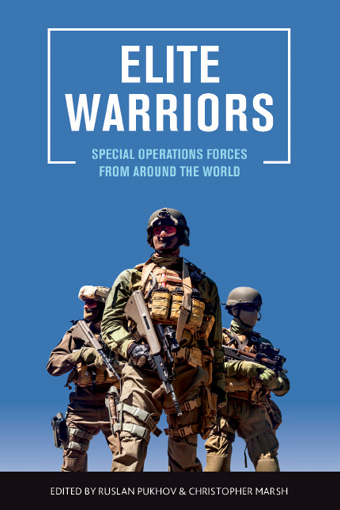Elite Warriors: Special Operations Forces from Around the World
Edited by Ruslan Pukhov and Christopher Marsh
East View Press, 2017
$79.95 263 pp.
ISBN: 978-1879944992
Reviewed by Bruce McClintock
Brigadier General Bruce McClintock, USAF (Ret.), is the Chief Executive Officer of Zenith Advisors Group, a full-spectrum startup and government consulting company.
 Special operations forces (SOF) have existed in some form and played roles in warfare since the advent of conventional military operations. For example, in biblical times, King David had a special forces platoon. World War II brought growth, greater recognition, and prestige for special forces like the British Commandos, Special Air Service, and the American Office of Strategic Services. The last two decades have witnessed explosive growth in various forms of unconventional or SOF.
Special operations forces (SOF) have existed in some form and played roles in warfare since the advent of conventional military operations. For example, in biblical times, King David had a special forces platoon. World War II brought growth, greater recognition, and prestige for special forces like the British Commandos, Special Air Service, and the American Office of Strategic Services. The last two decades have witnessed explosive growth in various forms of unconventional or SOF.
In Elite Warriors, Ruslan Pukhov and Christopher Marsh aim to provide accessible, high-quality comparative research on the elite SOF of 14 countries. They achieve some of their lofty objectives and add value to the important field of literature on special operations. Marsh, editor of the Special Operations Journal and professor at the U.S. Army School of Advanced Military Studies, opens the book by discussing the modern (post–World War II) proliferation of SOF and claims that many countries “seek to gain the status and capabilities” that come from possessing such specialized units. He then briefly describes the intent of the book—to fill the gap between “a vast body of literature that focuses on single cases of heroism, or at best, histories of single units” during a select period.
To help fill the gap, Elite Warriors provides descriptive chapters on the SOF forces of 14 countries in the following order: Russia, Ukraine, France, Germany, Italy, Poland, Iran, Israel, Jordan, Turkey, China, Singapore, Columbia, and Algeria. The book claims a format commonly used by the Center for Analysis of Strategies and Technologies (CAST), the Russian think tank co-founded and directed by Pukhov. CAST regularly employs a team of highly capable research analysts to provide summaries on a variety of topics—usually focused on Russia’s defense industry and national arms procurement program. Elite Warriors claims that each of the chapters provides a “brief historical background to that country’s special operations forces, then quickly moves to the present time, offering the reader a very comprehensive overview of the many units that exist, the missions which they are designed to address, and examples of some of the missions they have conducted.” Marsh states, “Encyclopedic in nature, it is filled with a wealth of information on the special operations forces of the countries included.”
Most chapters do include some form of historical discussion, a detailed organizational listing for known units, and some information on equipment used, as well as training and education. However, the diversity of contributors creates inconsistency in the format as well as the style of the different chapters. If read cover-to-cover, the inconsistency in the chapter organization is readily apparent, as is the level of detail available for various countries. The chapter on Iran, for example, provides good detail on the weapons used by Iranian SOF and provides basic information on recent operations in Syria with substantive footnotes of the sources for the information. Other chapters include substantially less detail, often citing the lack of available information. The chapters are generally short with the shortest being only eight pages and containing no information on equipment or training.
The strength of Elite Warriors is the variety of authors and their use of native-language sources, often from mass media and generally current, as well as other authoritative material. The generous use of footnotes makes the book a worthwhile resource for those who want a guide to other useful material. The book, however, fails to explain its rationale for the relevance or importance of the 14 selected countries. Readers will find value in the China and Iran chapters but wonder where they might find information on key allies including Japan, South Korea, Denmark, the Netherlands, and the United Kingdom. Furthermore, the inconsistent format and level of detail may frustrate some readers. Readers looking for more specifics on U.S. forces should examine Linda Robinson’s Masters of Chaos (PublicAffairs, 2009) and the more recent historical evaluation by Mark Moyers titled Oppose Any Foe (Ingram, 2017). Nevertheless, the material in Elite Warriors is valuable and the book is an ideal primer for someone without a background in special operations who wants to learn the basics about foreign military elites and have a guide to other useful sources. JFQ